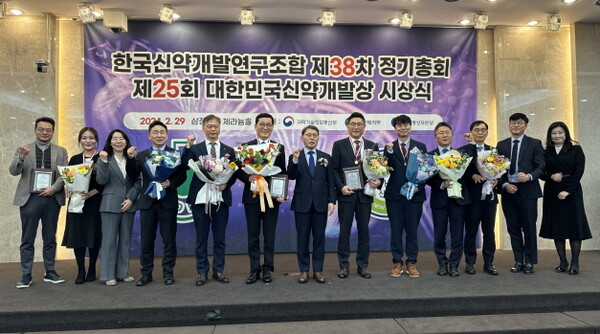The Korea Drug Research Association held the 25th Korea New Drug Development Award Ceremony in Seoul last Thursday.
At the ceremony, Yuhan Corp., which developed the non-small cell lung cancer (NSCLC) treatment Leclaza, and GC Biopharma’s immune disease treatment Alyglo co-won the grand prize in the new drug development category. Hanlim Pharm, which developed the surgical aid for removing breast lesions Luminomark Injection, was awarded an excellence award.
In addition, Chong Kun Dang, which developed CKD-510, a non-hydroxamic acid HDAC6 inhibitor; JI Innovation, which developed GI-301, an allergy treatment; and Onconic Therapeutics, a subsidiary of Jeil Pharmaceutical, developed Zastaparzan, a treatment for gastroesophageal reflux disease, shared the technology export award.

Leclaza, an NSCLC drug developed by Yuhan, is a home-grown new drug developed by Korean technology. It is regarded as a representative R&D open innovation success story in which Yuhan introduced a new drug candidate developed by a domestic bio venture and exported the technology to a global pharmaceutical company during clinical development. It is pushing for global commercialization by submitting a review for product approval in the United States and Europe.
Alyglo, developed by GC Biopharma, is an intravenous immunoglobulin preparation used for primary immunodeficiency, also known as congenital immunodeficiency. It is the eighth Korean drug to obtain U.S. Food and Drug Administration (FDA) approval. GC Biopharma aims to launch Alyglo in the second half of this year through its U.S. subsidiary, GC Biopharma USA.
Luminomark Inj., developed by Hanlim Pharm, is an improved surgical marker for breast lesion excision based on indocyanine green. It does not have the disadvantages of pigmentation and contamination, and the marker can be effectively adsorbed to cancerous lesions to mark the lesion's location accurately. The range of the lesion to be removed can be accurately checked by tracking the pigment in real-time, thus improving convenience and usefulness.
Chong Kun Dang’s CKD-510 is a small histone deacetylase (HDAC6) inhibitor with non-hydroxamic acid (NHA) platform technology. The company proved its safety, tolerability, and the possibility of formulation modification through phase I studies in France and the U.S. and succeeded in signing a technology export contract with global pharmaceutical company Novartis in November last year worth 1.73 trillion won ($1.3 billion).
GI-301, developed by GI Innovation, is a double fusion protein drug that applies long-acting technology to the extracellular part of FcεRIα, the IgE binding site. It is characterized by enhancing the drug's safety by removing the cell-killing functions inherent in antibodies such as ADCC and CDC while maintaining the function of increasing the half-life in the body.
In July 2020, the company signed a global regional (excluding Japan) technology transfer agreement worth 1.4 trillion won with Yuhan Corp. In October last year, it signed another technology transfer agreement worth 298.2 billion won with Japanese pharmaceutical company Maruho.
Zastaparzan, developed by Onconic Therapeutics, a subsidiary of Jeil Pharmaceutical, is a new drug candidate of the P-CAB class. Zastaparzan demonstrated non-inferiority to esomeprazole, a PPI, in a phase 3 study in patients with erosive esophagitis, showing excellent mucosal defect treatment effects. Onconic Therapeutics signed a technology export agreement with China’s Livzon Pharmaceutical Group worth 160 billion won in March last year.
At the award ceremony, lectures were given by each winning company to share their success stories in new drug development and technology export.
Presentations were made by Oh Se-woong, head of Yuhan Corp.’s research institute, Cha Kyung-il, who heads GC Biopharma’s research headquarters, Kim Jin-sun, head of Hanlim Pharmaceutical’s research lab, Lee Chang-shik, a Chong Kun Dang director, GI Innovation CEO Jang Myung-ho, and Onconic Therapeutics CEO John Kim.
The Korea New Drug Development Award, which is celebrating its 25th anniversary this year, was established in April 1999 by the Korea Drug Research Association to develop the Korean biohealth industry and inspire new drug research and development. Seventy-nine products and technologies from 40 companies have been awarded, including this year. It is sponsored by the Ministry of Science and ICT, the Ministry of Health and Welfare, and the Ministry of Trade, Industry and Energy.
Related articles
- Yuhan CEO Cho, key driver behind Leclaza success, will likely serve another term
- Yuhan Corp. marks record sales on tech export revenue in 2023
- Yuhan cruises in global markets, looking forward to 2 years from now
- Vaccine manufacturers affected by the endemic struggle to boost declining sales
- GC Biopharma’s operating profit halved due to plasma cost rises in 2023
- GC Biopharma’s blood product enters US market for 1st time

